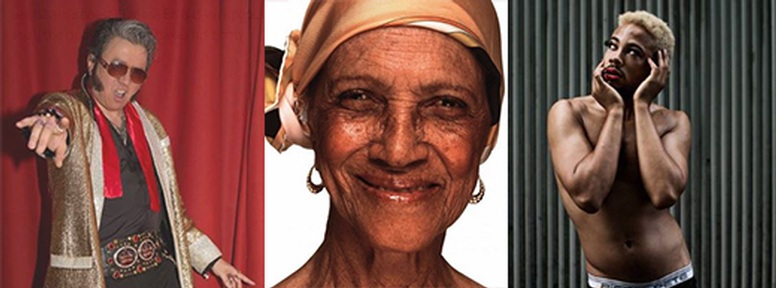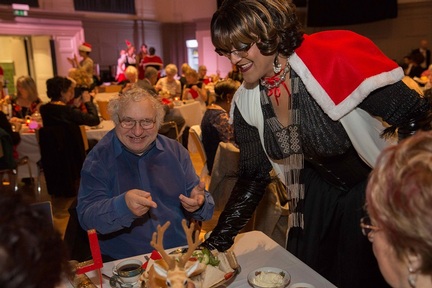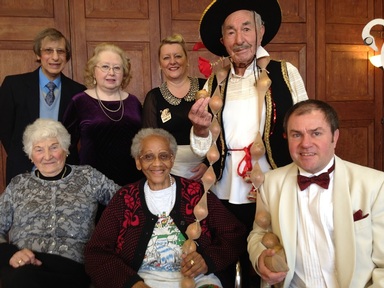Queer cabaret is a hit with 'lonely' and 'marginalised' older people
OAPs with plenty of swagger are getting dressed up for the theatre to watch cabaret acts such as drag queens, burlesque dancers and even a naked male ballerina.

The driving force behind The Posh Club is a group of mainly young volunteers who put 'on a show for older folk' who might be feeling lonely or marginalised within their communities.
Strictly no jeggings
The over 60s audience at The Posh Club are treated like ‘very special guests’, waited on ‘hand and foot’ by formal staff, who serve them three-course meals on ‘fancy crockery’. Their oldest 'regular', Irene, is 108.
The night is run by LBGT+ club hosts Duckie, who call themselves “arts enterprise, homo-social honky-tonk and performance clubs for extraordinary populations”.
Simon Casson is the mastermind behind Duckie, and creator of The Posh Club. He says of the high campery at their events: “It’s a disguise because actually it’s a community service to make older folk that might be feeling a bit vulnerable and a bit marginalised, feel less lonely.
“But we don’t say any of that, we just say, ‘it’s going to be a fabulous day out wearing your best frock, and do you like Elvis, tap dancing or hoola-hooping, or what kind of spectacular act do you like?’”
The Posh Club cabaret is very much in the vaudeville/ dancehall tradition of entertainment and is a mixture of ‘high art’ and ‘progressive, working-class entertainment’. There are now five different locations for the club, which include Crawley, Hackney and Elephant and Castle, with newer clubs recently opening in Hastings and Brighton.
Dressing up is a strict requirement of the Posh Club door policy. Simon says: “Everyone’s welcome, but you have to dress up! We don’t want any old riff-raff just turning up, you gotta look your best”. He insists the ‘regulars punters’ would complain if other people didn’t dress up. Jeans are a no no, and the club host adds: “Yes, we don’t want any jeggings, or, meggings” [which carehome.co.uk is reliably informed are ‘man-leggings’].
 He finishes: “You’ve got to wear the hats too, they’re not just for Ascot you know.”
He finishes: “You’ve got to wear the hats too, they’re not just for Ascot you know.”
Many of the regulars have some serious style of their own according to Simon. He says: “We have a lot of Caribbean ladies in the Hackney one, like Nellie, she’s 104, and she rocks the hats. She’s got quite a few selections. Fascinators at a jaunty angle, and you know, just looking a million dollars, because that’s also part of being well.”
“Everyone loves a bit of fake posh”
The idea for the Posh Club started in Crawley in West Sussex by Simon and his sister Annie for their mum who was in her 80s and feeling a bit lonely. Simon says: “My Mum moved from Hackney, where we grew up next to a little place near Gatwick airport called Crawley. There was nothing to do, whereas there was loads to do in London for older folk. So, my sister ran a tea party where she had three of her mates round and she made the sandwiches all nice.”
This experience got Simon thinking. He has always worked in performance and came up with the idea of a show for the elderly, with the audience being made to feel like they are ‘really special’. He says: “For 23 years I ran a gay club, at the Vauxhall Tavern with lots of fancy shows [Duckie], and I thought hey, let’s team up, let’s get some posh costumes, something a bit ‘Upstairs, Downstairs’ – you know being all formal with the punters, as we all know that everyone loves a bit of fake posh”
“We wanted to treat ordinary working-class people really well and give them some really good service. Basically, it’s a community service that’s a bit like a day out at the Ritz, but in drag.”
There is a lot of vintage styling at the events, which is particularly good for those who have dementia. Many are reminded of places like The Lyon’s Corner House which were tea shops in London and all over the country in the ‘40s and ‘50s. Essentially this was the ‘variety’ of the day before “TV kicked in.”
According to Simon, “We have lots of people with dementia, and they are very welcome”. Depending on the venue, Simon says there are some clubs which have a one-to-one volunteer service, where someone will pick up a person who has dementia and give them a lift, “hang out with them and then take them home at the end of the day”.
‘We have black Elvis, Chinese Elvis, or white Elvis - if you must’
Acts can range from contemporary dance to impersonators to opera signers; the set list is varied as Simon describes: “We have black Elvis, Chinese Elvis, or white Elvis - if you must; then we’ve got ‘The Bees Knees’ which are London’s finest flappers.”

Something which is especially popular at the London cabarets is the art of Burlesque. Simon admits they have trouble finding male burlesque acts, and the usual male strip acts are not classy enough for his discerning regulars. One stripper they booked “went way too far”, says the club host. He added: “He was a bit oily, and had a shower onstage and everything, and he probably just revealed a bit too much.”
However, the clientele at some of the venues are more daring than at others, as Simon explains: “We once had a naked male ballet dancer. He did Swan Lake with a massive swan and then right at the end he took all of his clothes off. But only for five seconds.”
Of course, full frontal male nudity, no matter how stylish, wouldn’t work at all of the Posh Club venues. Simon admits the ballet dancer probably wouldn’t have gone down well in Crawley, so they wisely decided to give it a miss there.
Not all the acts are strictly cabaret either, and there are moments which can be incredibly moving for everyone involved. Simon explains: “Music is very important. It might be a singalong, it might be dancing, And, when a whole room is listening to something beautiful like a chamber, or a classical music quartet, or an opera singer, or just a beautiful singer, listening attentively and poignantly to something meaningful, then that is what art is.
“Older folk that have lived for 90 years listen in a different way; all that history is listening with them.”
Latest Features News
 28-Nov-19
2019 Election: Labour pledges £10.8 bn for free personal care while Boris Johnson sidelines social care
28-Nov-19
2019 Election: Labour pledges £10.8 bn for free personal care while Boris Johnson sidelines social care
 18-Oct-19
Podcast: Wendy Mitchell and dementia: 'My biggest fear is not knowing who my daughters are'
18-Oct-19
Podcast: Wendy Mitchell and dementia: 'My biggest fear is not knowing who my daughters are'
 30-Sep-19
World's oldest diver aged 96 says 'never accept the fact you are getting old'
30-Sep-19
World's oldest diver aged 96 says 'never accept the fact you are getting old'
 27-Sep-19
Exclusive: Care minister backs care workers' call for time off to grieve and attend funerals
27-Sep-19
Exclusive: Care minister backs care workers' call for time off to grieve and attend funerals
 20-Sep-19
Podcast: Gyles Brandreth urges care workers to learn poetry with elderly
20-Sep-19
Podcast: Gyles Brandreth urges care workers to learn poetry with elderly